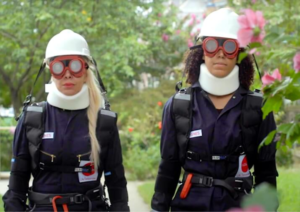Mar 30
Fast-Forward: Look Into Your Future

An enlightening film that emphasizes the importance of planning for aging
By 2045, an average American will live to the age of 85. Very few want to think about aging. Two thirds of Americans do little to prepare for being older. In Fast Forward: Look into Your Future, “four millennials and their parents spend a week in an immersive simulation experience 30 years into their future to learn what they might expect. They grapple with the realizations, conversations, actions, and mindset necessary to age successfully.”
To start the immersive experience, the eight participants are transformed into their future 30-year older selves by expert makeup artists who use prosthetic makeup, hair dye and in some cases, wigs. When each person is handed the mirror to see the result, shock and tears are frequently present. It is hard to image our aged selves. To help the individuals feel their future age, each person has an opportunity to wear AGNES (Age Gain Now Empathy System), a simulation suit designed by MIT Age Lab that replicates stiff aged muscles, vision impairment caused by various age-related issues, reduced ability to balance and sore joints. It is an opportunity to feel what it’s like to be in your 80s. Reactions included comments such as: “The world feels small. I can’t see that well. It is foggy, blurry. I can’t move very well. I have a feeling of helplessness like I couldn’t take care of myself anymore.”
Susan and her daughter Sophie learned a lot from the experience. Sophie had imagined that Susan would live in a renovated Air Stream Trailer on Sophie’s property when she was older, and Sophie would take care of her. Susan experienced life in the trailer wearing AGNES and quickly decided this was not the best solution. It felt claustrophobic and unsafe with her reduced mobility. Mother and daughter now know that they need to come up with a new plan.
Roger, age 65 and his 35-year-old son Drey attend a medical appointment for Roger together so they can both see what it might be like in the future. Some of the topics discussed convince Roger to take medical advice currently about some of his habits. It also heightened Roger and Drey’s appreciation of their relationship with each other. There are 40 million family caregivers in the US and 1 in 4 of those caregivers are millennials.
Even more than physical challenges, people fear cognitive problems. Experts recommend that if you have a family history of dementia, establish your own baseline on cognition so that you can recognize changes. Music helps preserve memory as we age. It also becomes a point of interaction when music from different eras triggers memories. Music and all the arts often keep older people happy and joyful.
While you may be thinking that this film is all doom and gloom, it is important to note that older people are statistically happier. Everybody’s story is different as we age and the takeaway from the immersive experiences created in Fast Forward is that we should be proactive in planning for our future. It is easier to be proactive than to be in a crisis where you must be reactive. If you understand a person’s values and what matters to them, then you will be prepared. Family members need to have conversations, make plans, and be prepared with documents such as Living Wills and Advance Directives so that they can best support their older loved ones.
There is a vast network out there helping people age with grace and support. To learn more about seeing the film and the compiled resources to help plan for successful aging, go to https://www.pbs.org/show/pbs-fast-forward/ and https://fastforwardmovie.com/about-fast-forward/.
* Photo above is Cast Members of movie, Fast-Forward wearing A.G.N.E.S. suits from the movie website: https://fastforwardmovie.com/about-fast-forward/


